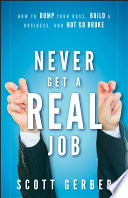

The book emphasizes the importance of embracing the gig economy, where traditional employment is being supplanted by freelance and contract work. This shift allows individuals to leverage their skills and passions in flexible ways, creating opportunities that align more closely with personal values and lifestyles. The gig economy fosters innovation and creativity, as individuals are more likely to pursue projects that excite them rather than being confined to monotonous job roles. The author argues that by entering the gig economy, one can cultivate a diverse portfolio of work experiences, which can enhance skills and lead to greater job satisfaction. This approach encourages readers to view work as a series of projects rather than a single career path, promoting adaptability and resilience in an ever-changing job market.
Continue readingA significant theme in the book is the necessity of adopting an entrepreneurial mindset, regardless of whether one intends to start a business. This mindset involves being proactive, innovative, and willing to take calculated risks. The author discusses how traditional education often does not prepare individuals for the realities of the modern workforce, where adaptability and problem-solving are crucial. By fostering an entrepreneurial mindset, individuals can identify opportunities in challenges, leverage their unique skills, and create value in various contexts. The book encourages readers to think like entrepreneurs by seeking out gaps in the market, experimenting with new ideas, and being open to failure as a learning experience. This mindset shift can lead to more fulfilling and impactful career paths.
Continue readingNetworking is presented as a vital component of career success in the book. The author emphasizes that building a robust professional network can open doors to new opportunities, collaborations, and mentorships. Unlike traditional networking, which often feels transactional, the book advocates for strategic networking that focuses on building genuine relationships. Readers are encouraged to engage with their network authentically, share knowledge, and support others, creating a reciprocal environment that fosters growth. The author provides practical tips on how to network effectively, including leveraging social media platforms, attending industry events, and cultivating relationships over time. By prioritizing meaningful connections, individuals can enhance their visibility and credibility in their fields.
Continue readingThe book underscores the importance of continuous learning in a rapidly evolving job market. The author argues that the traditional model of education is insufficient for preparing individuals for the complexities of modern careers. Instead, readers are encouraged to adopt a lifelong learning approach, actively seeking out new skills and knowledge through various channels such as online courses, workshops, and industry conferences. The book highlights the value of adaptability and staying current with industry trends, as this can significantly enhance one's employability and career prospects. By prioritizing skill development, individuals can position themselves as valuable assets in their respective fields, capable of navigating changes and seizing new opportunities.
Continue readingOne of the most empowering messages in the book is the idea of monetizing one’s passions. The author encourages readers to explore their interests and hobbies as potential income streams. This concept challenges the conventional notion of work being separate from personal fulfillment. By identifying what they love and finding ways to monetize those passions, individuals can create fulfilling careers that align with their values and lifestyles. The book provides examples of individuals who have successfully turned their hobbies into profitable ventures, illustrating that with creativity and determination, it is possible to build a career that is both enjoyable and financially rewarding.
Continue readingThe book advocates for a holistic approach to career and life, emphasizing the importance of work-life balance. The author argues that success should not be measured solely by professional achievements but also by personal well-being and happiness. Readers are encouraged to set boundaries, prioritize self-care, and create a work environment that supports their overall quality of life. The book discusses various strategies for achieving work-life balance, such as time management techniques, setting realistic goals, and recognizing the importance of downtime. By prioritizing balance, individuals can prevent burnout and maintain long-term productivity and satisfaction in both their personal and professional lives.
Continue readingFinally, the book challenges traditional definitions of success, urging readers to create their own metrics based on personal values and aspirations. The author posits that societal norms often dictate a narrow view of success, typically centered around financial wealth and status. Instead, the book encourages individuals to reflect on what success means to them personally, whether that be flexibility, creativity, impact, or fulfillment. By redefining success, readers can pursue paths that resonate with their true selves, leading to more meaningful and satisfying careers. The author provides exercises and prompts to help readers articulate their vision of success, emphasizing that this process is essential for aligning career choices with personal goals.
Continue readingThe reading time for Never Get a "Real" Job depends on the reader's pace. However, this concise book summary covers the 7 key ideas from Never Get a "Real" Job, allowing you to quickly understand the main concepts, insights, and practical applications in around 23 min.
Never Get a "Real" Job is definitely worth reading. The book covers essential topics including Embrace the Gig Economy, Develop an Entrepreneurial Mindset, Network Strategically, providing practical insights and actionable advice. Whether you read the full book or our concise summary, Never Get a "Real" Job delivers valuable knowledge that can help you improve your understanding and apply these concepts in your personal or professional life.
Never Get a "Real" Job was written by Scott Gerber.
If you enjoyed Never Get a "Real" Job by Scott Gerber and want to explore similar topics or deepen your understanding, we highly recommend these related book summaries:
These books cover related themes, complementary concepts, and will help you build upon the knowledge gained from Never Get a "Real" Job. Each of these summaries provides concise insights that can further enhance your understanding and practical application of the ideas presented in Never Get a "Real" Job.